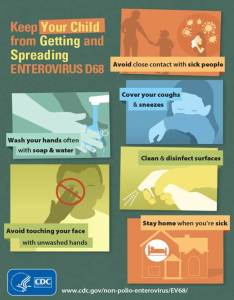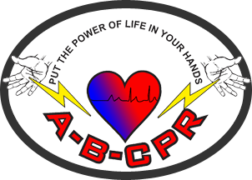 What Early Care and Education Providers and Families Should Know About Enterovirus D68
What Early Care and Education Providers and Families Should Know About Enterovirus D68
The Administration for Children and Families has received questions from Head Start and child care programs about recent news reports of Enterovirus D68 (EV-D68) spreading across the country. Infecting about 10 to 15 million Americans each year, enteroviruses are very common, especially during the summer and fall months. Infants and children are more susceptible to infection due to developing immune systems and the lack of prior exposure to viruses. Pregnant women also have a greater chance of being infected but will only develop mild or no symptoms. In fact, most people who acquire enteroviruses do not get sick. However, EV-D68 can cause mild-to-severe respiratory illness. Children with asthma could have a higher risk for severe respiratory illness caused by EV-D68 infection.
Similar to the common cold, mild symptoms can include fever, runny nose, sneezing, coughing, and body and muscle aches. Severe symptoms can include wheezing and difficulty in breathing. Some individuals could develop heart or brain infections or even become paralyzed.
You can get infected with enteroviruses by having close contact with an infected person who coughs or sneezes. You can also get infected by touching objects or surfaces that have the virus on them and then by touching your mouth, nose, or eyes.
Currently, there is no specific treatment, antiviral medication, or vaccine for people with respiratory illness caused by EV-D68. For mild respiratory illness, symptoms can be relieved with over-the-counter medications for pain and fever, such as ibuprofen or acetaminophen. Aspirin should not be given to children. Individuals with severe respiratory illness might need to be hospitalized.
You can help prevent yourself from getting and spreading EV-D68 and other respiratory illnesses by following these steps.
- Wash hands often with soap and water for 20 seconds.
- Avoid touching your eyes, nose, and mouth with unwashed hands.
- Avoid close contact, such as kissing, hugging, and sharing cups or eating utensils, with people who are sick.
- Cover your coughs and sneezes with a tissue or shirt sleeve, not your hands.
- Clean and disinfect frequently touched surfaces, such as toys and doorknobs.
- Stay home when you are sick.
Early care and education providers are encouraged to use the following standards from Caring for Our Children. Please share the information provided below with families to help prevent the spread of the enterovirus as well as other contagious illnesses.
- Standard 3.1.1: Daily Health Check
- Standard 3.2.2.2: Handwashing Procedure
- Standard 3.2.3.2: Cough and Sneeze Etiquette
- Standard 3.3: Cleaning, Sanitizing, and Disinfecting
For more information, see www.cdc.gov/non-polio-enterovirus/EV68/ and https://eclkc.ohs.acf.hhs.gov/hslc/tta-system/health/safety-injury-prevention/hygiene-sanitation/enterovirus.html.




